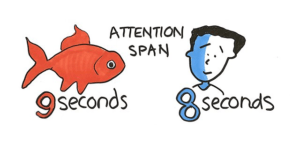The Body of a Great Sermon Holds Attention
The Body of a Great Sermon Holds Attention
The last two posts have focused on some general truths about introductions to great sermons. Now we turn to the main body of the sermon. The general truth here is this: the body of a great sermon holds attention of distracted people.
The Problem to Hold Attention
I was reading recently about the decline in the attention span of Americans. Our addiction to cell phones, media nad computers decreased our attention span. Here’s the conclusion of one study:
What is the price we pay to order donuts at 3am, Facetime a mate in France and learn about 40s fashion simultaneously? A recent study by Microsoft concluded that the human attention span has dropped to eight seconds – shrinking nearly 25% in just a few years.
Another study found this disturbing trend:
 Consider this: The average human attention span is now shorter than a goldfish’s. A recent study found that the average human attention span has fallen from 12 seconds in 2000 to eight seconds today. It is reported that goldfish have a 9-second attention span.
Consider this: The average human attention span is now shorter than a goldfish’s. A recent study found that the average human attention span has fallen from 12 seconds in 2000 to eight seconds today. It is reported that goldfish have a 9-second attention span.
Part of the reason for this decline in attention span is the fact that on television or in the movies, the image on the screen changes every few seconds, and life doesn’t. Another study speculated abut the cause. The researcher said that back in the prehistoric days, movement caught peoples’ attention. Why? Because movement around you could signal something dangerous. When we see or sense movement, we pay attention, and because we are being inundated with movement, we now need it to be able to pay attention.
The Challenge to Holding Attention
I’m sure you see the problem about now. Most of us preach in situations where we are going to stand in front of a  group for 30 to 45 minutes and give a monologue. The image isn’t going to change for your listeners. It’s just you, at least most of the time. We learned something about using introductions to “hook” peoples’ attention, but once you’ve got it, how do you hold it? The body of a great sermon holds attention for a full 30 to 45 minutes. How do you accomplish that?
group for 30 to 45 minutes and give a monologue. The image isn’t going to change for your listeners. It’s just you, at least most of the time. We learned something about using introductions to “hook” peoples’ attention, but once you’ve got it, how do you hold it? The body of a great sermon holds attention for a full 30 to 45 minutes. How do you accomplish that?
Here are some tips that hopefully will help you.
Don’t Include Too Much Information
One of the temptations I’ve seen in the inexperienced preacher is to try to include everything from your study in the sermon. They throw in information without regard to how pertinent it is to the main point of the message. One of the challenges of preaching is to decide what not to include as you move from study material to sermon development.
 I think of a seminary professor that I once invited to preach. He knew a lot–I mean a lot. We learned about the political climate of the day in which the New Testament was written, about the kind of clothing the people wore, about the map of Jerusalem in the days of Jesus, and about the architecture of the buildings near where an event happened. I am a lover of history, and so I was tuned in, but when I looked around, I saw people checking out. Later, in conversation, I found that people were impressed with the man’s knowledge, but they had trouble telling me what the sermon was about. They had tuned out.
I think of a seminary professor that I once invited to preach. He knew a lot–I mean a lot. We learned about the political climate of the day in which the New Testament was written, about the kind of clothing the people wore, about the map of Jerusalem in the days of Jesus, and about the architecture of the buildings near where an event happened. I am a lover of history, and so I was tuned in, but when I looked around, I saw people checking out. Later, in conversation, I found that people were impressed with the man’s knowledge, but they had trouble telling me what the sermon was about. They had tuned out.
You may impress people, but you really want Scripture to impress people.
Don’t Use Too Many Illustrations.
My temptation is not including too much historical and political information. My temptation is to include too many stories. I’ll find some good ones, and just want to share them. My wife reminds me occasionally about this temptation.
Here his now Brandon Hilgemann puts it (I’ve referred to him often, because I find his book, Preach and Deliver to be so very helpful):
After you write the message, you have to cut all details that aren’t necessary. Eliminate anything that is too repetitive. Kill tangents. Trim your stories to only the essential information. Get to the point, and stay there.
Remember that the body of a sermon holds attention of listeners. I’m going to continue this subject in the next post as well. For now, here’s a video from Toastmasters, an organization that specializes in helping people be more effective in speaking in many different settings.



